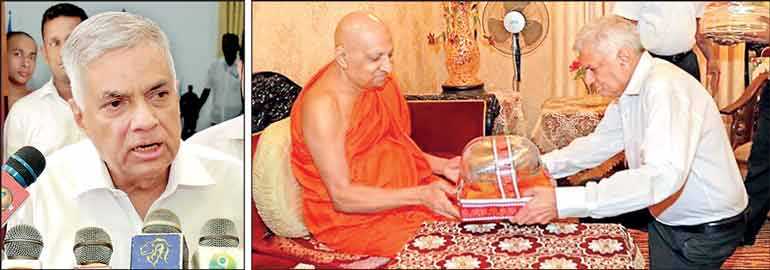Tuesday Feb 17, 2026
Tuesday Feb 17, 2026
Friday, 10 May 2019 00:10 - - {{hitsCtrl.values.hits}}

Prime Minister Ranil Wickremesinghe yesterday said discussions on the Counter-Terrorism Act (CTA) will be held with all party leaders in the coming weeks, to build consensus ahead of getting it approved by Parliament at the earliest possible opportunity.
Wickremesinghe, speaking to media in Kandy, said the CTA was important to counter global terror in Sri Lanka, as it moved past the constraints of the existing Prevention of Terrorism Act (PTA). The Prime Minister stressed that clauses two, three and four in the CTA were essential to effectively respond to the sort of international terror networks that are suspected of having influenced the Easter Sunday attacks.
The Prime Minister was in Kandy to meet with the heads of the Malwatte and Asgiriya chapters. During discussions, Wickremesinghe had thanked the Maha Nayakas for supporting the Government to maintain calm in the country, and prevent widespread communal clashes following the attack that left over 250 people dead and about twice that number injured.
He also discussed how to foster religious harmony in the country, and observed that Buddhists, Hindus, Catholics, and Muslims, while following global teachings, nonetheless have evolved practices and beliefs that were intrinsic to Sri Lanka, and these traits need to be promoted to build a Sri Lankan identity.
The Prime Minister in Parliament this week called for the unconditional support of political parties for the CTA. The CTA was formulated and presented to Parliament in the second half of 2018, but ran into delays due to the constitutional crisis in October. Since then, the draft Bill has been presented to the parliamentary National Security Oversight Committee for evaluation. Changes to the CTA can still be incorporated ahead of it being passed by Parliament.
However, Opposition Leader Mahinda Rajapaksa on Wednesday requested Prime Minister Ranil Wickremesinghe to appoint a parliamentary Select Committee to study the proposed Counter-terrorism Act (CTA), and provide recommendations.
Pointing out that the objections to the CTA were flowing in from different stakeholders, including civil society and other political parties, Rajapaksa had made the request from Wickremesinghe, a short statement released by the Opposition Leader’s Office said.
Rajapaksa has been a vociferous opponent of the CTA, insisting it will be less effective than the existing Prevention of Terrorism Act (PTA), and provides too many rights to people suspected of terror-related activities. He has backed keeping the PTA intact, and has accused the Government of pandering to the international community by proposing the CTA. The Sri Lanka Podujana Peramuna (SLPP), of which Rajapaksa is the de-facto leader, has protested the CTA on the grounds that it could infringe on public rights, such as the right of workers to collectively protest.